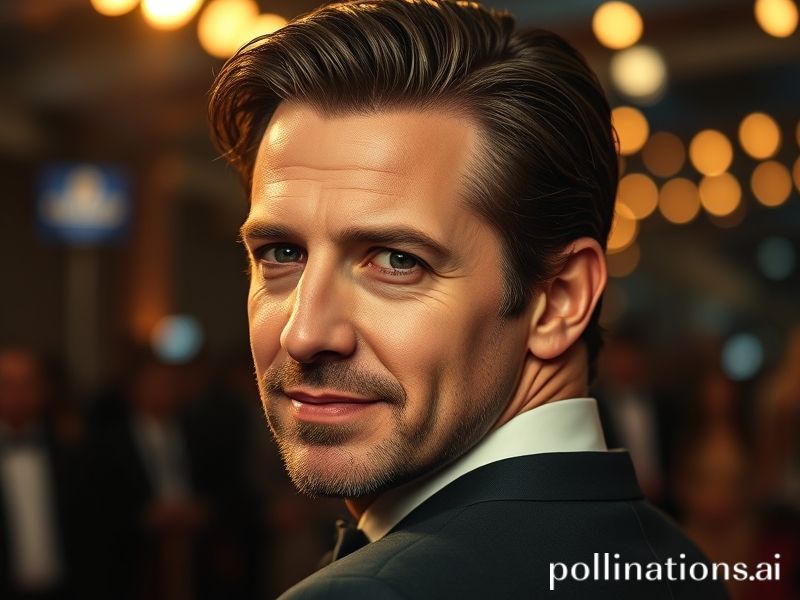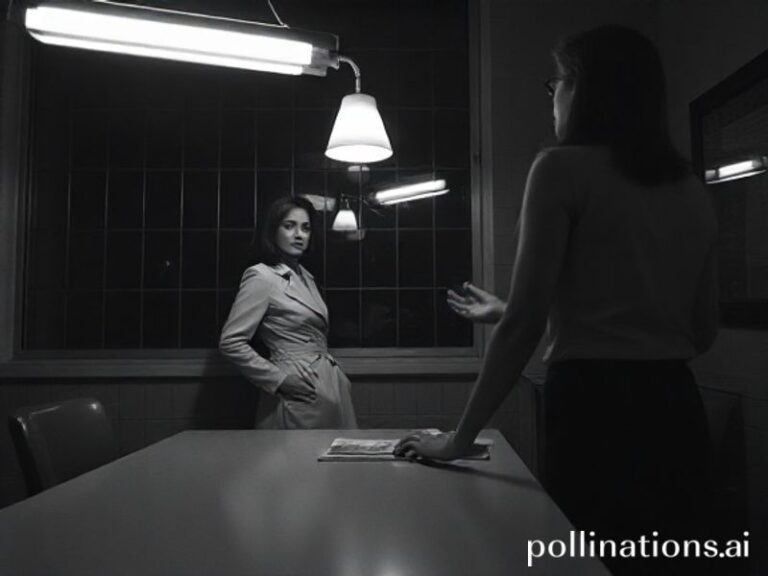Bradley Cooper: The Accidental American Trade Surplus Hollywood Never Negotiated
Bradley Cooper: The Last American Export That Still Works
GENEVA—While the U.S. dollar wobbles like a drunk tourist on the Pont des Arts and Silicon Valley’s greatest minds debate whether reality is merely a subscription tier, one product from the former superpower continues to clear customs without a cavity search: Bradley Cooper. Yes, the man who once played a sentient raccoon has become, in diplomatic circles, the closest thing Washington has to soft power that doesn’t require congressional oversight or an aircraft carrier.
From the neon canyons of Tokyo—where Lost in Translation is now considered quaint—to the smoke-hazed rooftop bars of Istanbul, Cooper’s face flickers across screens like a benevolent deepfake of American aspiration. He speaks French at the Césars, Italian on Rai Uno, and German on ZDF with the fluency of a man who realized early that English is merely the gateway drug to global market share. Meanwhile, the State Department still can’t get its interns to pronounce “Qatar” correctly on the first try.
The numbers are almost obscene. A Star Is Born grossed $436 million abroad, roughly the GDP of Fiji. Air—his Nike origin story that doubles as capitalist hagiography—is being studied in Shenzhen business schools as a case study in how to sell sneakers to people who already manufacture them. And in a delicious irony, Maestro, his upcoming Bernstein biopic, is bankrolled by Netflix, a company whose quarterly earnings report is now more closely watched in Brussels than any NATO communiqué. Somewhere in a Davos sub-basement, Henry Kissinger’s ghost is updating its LinkedIn.
What makes Cooper the rare American commodity that doesn’t attract EU tariffs is his willingness to perform humility in twelve languages. Watch him on the Cannes red carpet: the sheepish grin, the self-deprecating shrug, the tuxedo that whispers, “I, too, am but a mortal who once ate at Subway.” It’s a masterclass in weaponized modesty—an emotional stealth bomber flown straight into the heart of European cynicism. The continent that gave us Sartre and smugness finds itself clapping for a man who once starred in The Hangover Part II. If that isn’t a war crime, the Hague needs broader statutes.
Of course, no empire exports a star without also shipping the neuroses. Cooper’s on-screen characters are increasingly haunted men: drunk, deaf, or hopelessly in love with Lady Gaga—symptoms that map neatly onto the American malaise currently being binge-watched by the rest of the planet. Foreign audiences recognize the pattern: first you get the affable charmer, then the cautionary tale, then the reboot nobody asked for. It’s the same arc Rome followed, just with better lighting and a Dolby Atmos track.
The Chinese market, ever the geopolitical mood ring, offers its own verdict. Despite official quotas and nationalist pep rallies, bootleg DVDs of Silver Linings Playbook are traded in Shanghai universities like samizdat. Professors assign them in psychology seminars under the course title “Advanced Codependency Studies,” which is either cultural exchange or the most passive-aggressive sanctions regime ever devised. Either way, Beijing allows it, proving that even the Great Firewall has a Cooper-shaped hole.
All of which raises the uncomfortable question: if one man’s jawline can outmaneuver trade wars, what does that say about the rest of us? While diplomats argue over carbon credits and microchip embargoes, Cooper is in Budapest learning to conduct Mahler for a streaming platform that will beam his pixels into 190 countries before the next G7 summit finishes its dessert course. The planet is burning, supply chains are collapsing, but somewhere a server farm in Iceland is cooling itself just to render his stubble in 8K. Priorities are adorable like that.
So raise a glass—preferably something French and overpriced—to the last functioning American institution. Not the Constitution, not the Fed, but a 48-year-old actor-director who has somehow turned personal angst into a multilateral trade agreement. When historians sift through the rubble of this century, they may conclude that the most reliable U.S. export wasn’t democracy or crude oil, but a guy from Philadelphia who convinced the world that its own heartbreak looked better through an American lens. And honestly? Given the alternatives, we could do worse. We usually do.







